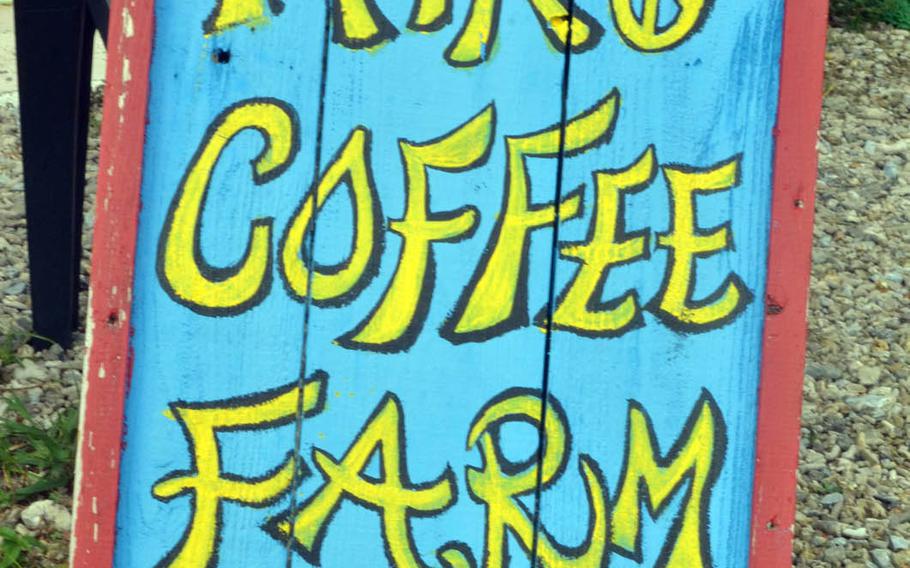
A hand-crafted sign welcomes customers to Hiro Coffee Farm in Okinawa, Japan. (Dave Ornauer/Stars and Stripes)
You might call Hiro Coffee Farm in northern Okinawa simply unsinkable.
Owner Hiroko Adachi could have surrendered, given up and gone on to do something else in October 2012 after three typhoons in a six-week span devastated the business that her father started in 1993.
She credits her comeback to the encouragement and rebuilding support she’s received from customers — from casual one-stoppers to the regulars, including Marines from the nearby Jungle Warfare Training Center.
“Seeing many Marines and local residents coming to offer us help changed my mind” about giving up the business, Adachi said. “They gave me the courage to start all over again.”
Starting again seemed impossible, Adachi thought, after the typhoons either directly hit or sideswiped Okinawa, leaving devastation from Hedo to Itoman.
“That’s it,” Adachi said she thought as she surveyed the damage. That came on top of losing her father, Hiroshi, in 2009.
Recovery began, Adachi said, with help from a retired Marine master sergeant, Timothy Dennis, one of Hiro Coffee Farm’s regulars. Dennis, of Columbia, S.C., posted a message and photos of the typhoon-damaged coffee farm on his Facebook page. Soon after, he brought in Marines from the jungle warfare center to help clean up the farm and its adjoining shop.
“That’s what you do for a friend,” Dennis said of Adachi’s father. “Awesome individual. I loved what he had up there.”
Recovery was far from easy. When Adachi’s father established the farm, he’d planted 1,000 coffee trees, most of which were wiped out by the 2012 storms. Adachi now makes coffee with beans imported from Brazil, where her father learned how to grow coffee plants.
She does have a couple of hundred coffee plants in her backyard, which she hopes will produce beans to mix with the imported ones — hopefully by year’s end, she said, if no typhoons hit the area.
“A small step by step, but I decided to keep moving on to continue this farm,” she said.
The beans may be imported, but she home-roasts them, as she did before the typhoons, with the help of an assistant who came to help after the storms, Adachi said.
In addition to various flavors of coffee, hot or iced, Hiro Coffee Farm also serves homemade ice cream made with free-range eggs harvested from two hens Adachi keeps on the property; she keeps two roosters as well.
The homemade ice-cream floats, she says, are the most popular item among her American clientele.
Patrons gather around a wooden table on faded benches inside an open-air sitting room with no air conditioning. It has a distinct 1960s peacenik air; a welcome mat out front is adorned with peace signs. Movie posters in psychedelic lettering adorn the walls.
Photographs and souvenir cups can be purchased along with beans and organic snacks that customers can purchase to go.
The coffee farm attracts a wide-ranging clientele, Adachi said, particularly with the ongoing construction of military helicopter landing pads close by. Helicopters recently began flying low over the farm, “something totally unexpected when my father opened the farm here,” she said.
That means folks staging protests against the helipads come by for refreshments.
“But at the same time, many Americans, including Marines … stop by, too,” Adachi said, referring to those on both sides as “precious patrons and supporters” who give her strength to move on.
“I want to make this place where people can purely enjoy good coffee, setting aside worldly concerns,” she said.
Hiro Coffee Farm
DIRECTIONS
Address: 85-25 Takae, Higashi-son, Kunigamigun, Okinawa 905-1201. From Okinawa Expressway, take Exit 9 (Ginoza), turn left onto Highway 329, north past Camp Schwab. Road then curves left to next traffic signal with right turn onto Highway 331. Road meets at a T-section; stay on road and proceed straight to Highway 70. About an hour north of Camp Schwab, Hiro Coffee Farm will be on right.
HOURS
11 a.m. to 5:30 p.m. Thursday-Monday.
PRICES
Coffee, 400-500 yen (about $4-$5); local tropical juice, 350-450 yen; cafe mocha or homemade ice-cream coffee or organic cocoa, hot or iced, 500-600 yen; free-range egg-coffee pudding or coffee jelly, 400-450 yen. Strong-roast coffee beans cost 350 yen for 50 grams, 700 yen for 100 grams and 1,400 yen for 200 grams; medium-roast beans cost 300 yen for 50 grams, 600 yen for 100 grams and 1,200 yen for 200 grams.
INFORMATION
Phone: 0980-43-2126; website: www.hirocoffeefarm@k5.dion.ne.jp.